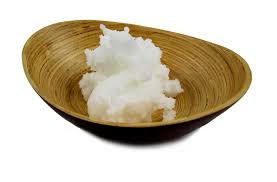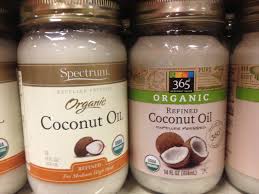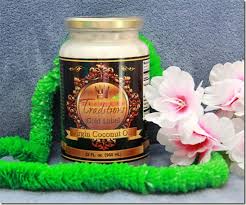Guide to Buying and Using Coconut Oil
Recipe Key
Are you confused about which coconut is best?
Here is your coconut oil buying guide.
You will know what to buy and how to use the different varieties.
 You know how much I love coconut oil. It is good for your metabolism and helps burn fat. It keeps you healthy by boosting your immune system. In addition it is great for your skin and hair. I especially like it in the bedroom when as a post menopausal woman things can get a little dry. This is the type I use for my body.
You know how much I love coconut oil. It is good for your metabolism and helps burn fat. It keeps you healthy by boosting your immune system. In addition it is great for your skin and hair. I especially like it in the bedroom when as a post menopausal woman things can get a little dry. This is the type I use for my body.
It can be confusing when you look in the store and see so many different types. How do you know whether to get refined or unrefined? What is the difference between, virgin, extra virgin, raw? What is expeller pressed? Is the expensive, high quality coconut oil better than the cheaper versions?
In today’s post I’ve created a useful guide to answer common questions about coconut oil.  Special Properties of Coconut Oil
Special Properties of Coconut Oil
Coconut oil is a good fat full of medium chain fatty acids (MCFA’s) which boost your metabolism. The way it works is the MCFA are small molecules that are metabolized in the liver and immediately absorbed and converted into energy. It provides steady even energy, unlike glucose that gives you a burst of energy and then a drop. Other fats and oils are made up of long chain fatty acids, or long-chain triglycerides, which are larger molecules that are difficult for your body to break down and are mainly stored as fat.
Coconut oil contains another amazing health-promoting compound, lauric acid. Pure coconut oil contains about 50 percent lauric acid. It is converted by the body into monolaurin which is effective in preventing and treating many bacterial and fungal infections such as candida, athlete’s foot, measles and influenza. Many people who regularly consume coconut oil experience less sickness. Breast milk is the only other natural source that contains such a high concentration of lauric acid, which could explain why breastfed babies are healthier.
Benefits of Coconut Oil:
- Boosts metabolism & aids with weight loss.
- Improves insulin secretion and utilization of blood glucose.
- Improves heart health & reduces health risks associated with diabetes.
- Supports thyroid function.
- Supports immune system.
- It’s anti-fungal, antiviral & antibacterial.
- Promotes healing & tissue repair.
- Improves digestion & nutrient absorption.
- Enhances physical performance.
- Hydrates and protects the skin, improves skin tone and prevents wrinkles and skin aging.
- Reduces psoriasis, eczema symptoms.
- Improves hair and scalp condition.
- It’s a quick energy source and controls sugar cravings.
- Relieves stress on pancreas and enzyme systems of the body.
- Helps relieve symptoms associated with chronic fatigue syndrome.
- Helps protect against kidney disease and bladder infections.
- And much more.
Refined vs Unrefined
There are two main kinds of coconut oil: refined and unrefined. If you know what to look for, they are both good but are used for different purposes.
Refined Coconut Oil
- Good for High Temperature Cooking – Refined coconut oil has a high smoke point. This makes it a great choice for cooking, baking and frying.
- Neutral Flavor – Cooking with coconut oil provides nutrition but you don’t always want your recipes to taste like coconut. The refining process removes the fragrance and flavor, making it neutral, good for many dishes. It is great for sautéing or deep frying at high temperatures without the flavor of coconut.
- Less Expensive with Good Nutritional Value – It still has the beneficial medium chain fatty acids; it’s close in its nutritional value to virgin coconut oil but be careful about the extraction method and chemicals that have been applied.
What to check for when buying Refined Coconut Oil:
- Stay away from coconut oil extracted with chemicals – Sometimes refined coconut can be extracted using chemical solvents and bleach. It is often labeled as “RBD” meaning refined, bleached and deodorized. You don’t want this kind. This process diminishes nutritional value and makes it toxic. What you want is a refined coconut oil that is refined using a natural, chemical-free cleaning process (usually involving steam and/or diatomaceous earth).
- Make sure it is the non-hydrogenated type – Most coconut oil in stores is refined unless it says unrefined. Many coconut oils are hydrogenated or partially hydrogenated. Don’t buy those, the hydrogenation process creates synthetic trans-fats.
- Buy in either a glass jar or BPA free plastic container.
There are many brands available. These are 2 brands of refined coconut oil I like:
Nutiva Organic Coconut Oil, Refined
- Steam-refined, non-hydrogenated
- High smoke point
- Neutral scent and flavor
- Cholesterol free
- Non-GMO
- USDA certified organic
Spectrum Organic Refined Coconut Oil
- Expeller Pressed
- USDA Organic
- Refined For Medium High Heat
- Very little coconut flavor
- No Hydrogenated Fat
Unrefined Coconut Oil
- Unrefined coconut oil comes from the first pressing of fresh, raw coconuts using a mechanical process without chemicals.
- Virgin vs Extra Virgin – according to my research there is no difference between “virgin” and “extra virgin”. You don’t need to pay extra for something labeled extra virgin.
- Stronger Coconut Flavor – Unrefined has more of a coconut taste than refined coconut oil. If the coconut oil is exposed to heat during the extraction method there will be even more coconut flavor in the oil. Good raw, unrefined, virgin coconut oil should have only a mild coconut flavor and scent.
- Superior Nutrition – there is more lauric acid and MCFA in unrefined coconut oil than refined coconut oil.
What to check for when buying unrefined coconut oil:
If the oil has an intense flavor it means it was exposed to more heat during the expelling process. Some unrefined coconut oils can even taste like toasted coconut. Better quality unrefined, virgin coconut oils will have a mild coconut flavor and scent.
Brands I like:
Tropical Traditions Gold Label Virgin Coconut Oil
- Non-GMO
- No Chemical Solvents
- USDA Certified Organic
- Mild Coconut Taste
- Made from Fresh Coconuts
- High Level of Antioxidants, MCFA and Lauric Acid
Nutiva Organic Virgin Coconut Oil
- Non-GMO
- Non-Hydrogenated
- USDA Certified Organic
- Cold Pressed
- Light Coconut Taste and Aroma
- Made from Fresh Coconuts
- High Levels of Lauric Acid and MCFA
Extraction Methods
Coconut oil can be extracted using cold pressed, expeller pressed or centrifuged methods. These methods use dry or fresh coconuts and can be used for both refined and unrefined varieties.
Some expeller pressed oils are heated to high temperatures during the extraction process. This will not make the oil go rancid as coconut oil is highly stable. It will make the oil have a stronger coconut flavor. If you want a mild delicate flavored coconut oil look for a cold pressed oil which is centrifuged and less likely to be exposed to heat during extraction. It is usually called raw.
Refined coconut oil is made from dried coconut, also known as copra; dried copra is not fit for consumption and the oil needs to undergo processes to filter out impurities and make it more stable. This refining process should be done using a natural, chemical-free cleaning process (usually involving steam and/or diatomaceous earth) not chemicals. Coconut oil made from dried coconut meat can become moldy during storage, Some people may have a reaction to the mold. They should use an expeller-pressed brand from fresh coconuts, which would be unrefined.
How Much Coconut Oil To Use:
The research says about 3 Tb per day will give you the MCFA’s needed for a good metabolism. It is best to eat it with food high in fiber and protein. If you are new to coconut oil start out with less and see how your body reacts. If you eat too much you may get diarrhea.
Storing Coconut Oil:
Coconut oil does not need to be refrigerated. If you put coconut oil in the refrigerator, it becomes solid. It may turn to liquid in the summer months as it melts at 75 degrees. Keep it away from the light.
How to use refined and unrefined coconut oil:
- Use refined in cooking, it is very heat stable without any coconut flavor. I use it for sautéing, stir frying, like my Braised Greens with Tempeh and deep frying (if I ever make French fries).
- When cooking Asian food at medium temperature use unrefined. The coconut flavor goes well with the tastes.
- Add a tablespoon of unrefined to smoothies, coffee or tea. When added to coffee and blended it makes a nice frothy latte.
- Mix unrefined coconut oil with cacao and honey, spread on apple slices for quick energy. Great before a workout. (it won’t work on a hot day unless you keep it in the refrigerator)
- Use refined or unrefined in desserts depending on whether you want a coconut flavor or not. I used refined my Raw Vegan Bittersweet Chocolate Tart
- Use unrefined for oil pulling.


